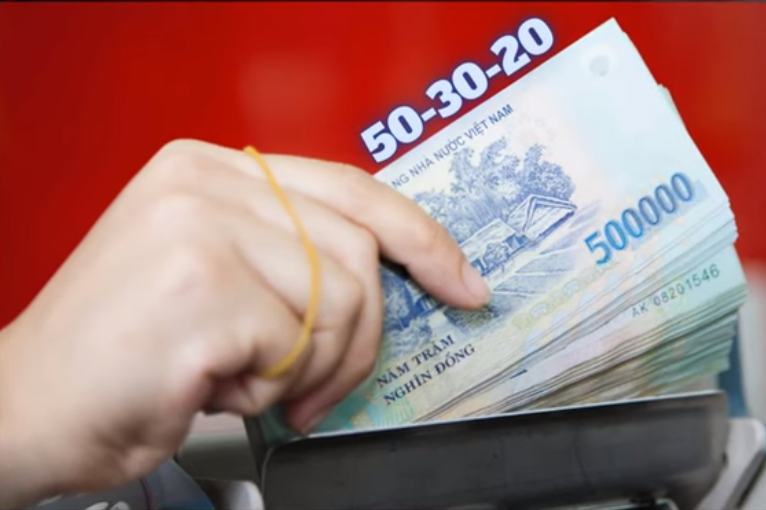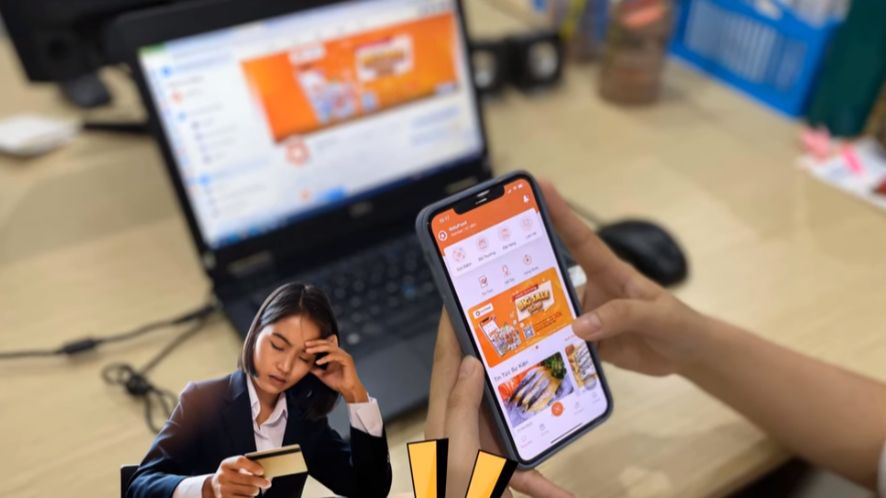As life progresses, our daily activities have become more convenient than ever, especially online payments and transactions. Three to four years ago, we were still accustomed to cash payments, but now, scanning QR codes or swiping bank cards has become a daily habit for many people. However, everything has two sides; convenience will always come with potential issues.
Where did the money go?

After receiving 20 million VND in salary for just over half a month of work, Thanh Huyền, a 27-year-old girl living in District 3, Ho Chi Minh City, checked her bank account and was shocked to find that she had only a little over 1 million VND left. She described this feeling as akin to being robbed because she never thought she could spend almost all of her salary in just half a month. Upon reviewing her transactions, Huyền discovered that she had made over 100 purchases, including clothes, shoes, food, cosmetics, plane tickets, and hotel bookings for her upcoming trip, many of which were made in the early morning while scrolling through social media.
Huyền's habit of not carrying cash has been around for about three years since QR code money transfer apps or electronic wallet payments became popular. All her spending occurs entirely on her smartphone. However, since then, the girl who used to spend about 10 million VND a month now often finds herself out of money before the month ends. Huyền shared that she thought not seeing the money would prevent her from spending, but in reality, she ended up spending even more because there are card readers or transfer options everywhere.
Two years ago, 40-year-old Bảo Châu, living in Hải Phòng, still frequently used cash for her monthly expenses. As a single mother, she would divide her salary into necessary spending and save the rest. However, since receiving her salary through a bank account, Châu has started to prefer online payments. This has disrupted her previously scientific spending management plan with a total monthly salary of 30 million VND for her and her husband. Previously, they could save nearly 50% of their income, but now, once the salary is gone, so is the money, due to paying bills for electricity, water, and school fees for her child, shopping for clothes and food, and even lending money to friends, all done through online transfers.
Châu shared that before, every time she decided to buy something, she would calculate how much money was left in her wallet and carefully consider whether to spend or not. She felt a pang of regret as she saw the money in her wallet gradually decrease. But now, whenever she wants to buy something, she immediately scans a QR code or swipes her card, only realizing her account is depleted when the machine reports that the transaction cannot be completed due to insufficient funds.
The cashless effect

This phenomenon has been named the cashless effect by Associate Professor Dr. Đỗ Minh Cương, a former lecturer at the National Economics University in Hanoi, referring to the tendency of people to spend more when not using cash. According to the American financial site Net Wallet, cash is a tangible object with emotional value attached to it. When spending, seeing the cash disappear from the wallet easily creates pain when having to part with money. But with bank cards or online payments, transactions and notifications of deductions often do not make consumers feel remorseful, and they tend to continue spending uncontrollably. A market research by John and BR Street in 2023 also showed that people tend to spend 12% to 18% more when using cards instead of cash.
According to Associate Professor Cương, the advancement of digital technology and the ability to transfer money quickly have led many people to prefer cashless payments. This is also a common trend in developed countries towards a more convenient and comfortable life thanks to technology applications. A study on the payment attitudes of Vietnamese consumers in 2023 conducted by Visa showed that the average time a Vietnamese person does not use cash is 11 consecutive days in a month, nearly four times compared to 2022. 56% of respondents said they carry less cash, leading to less money kept in wallets and reduced cash usage. According to Visa, 62% of respondents frequently use contactless payments, averaging 16 times a month, higher than the 12 to 13 times when using bank cards.
Notably, Vietnam leads Southeast Asia in the percentage of people who have used cashless payments, with 88% of the population, and is also among the top countries with rapid growth in electronic wallet usage. According to data from Fin Group, for every five Vietnamese, at least four use electronic wallets regularly, mostly aged 18 to 40. Data from the State Bank indicates that as of January 2024, the country has nearly 21,000 ATMs, a decrease of 2% compared to the same period in 2023. The overload of ATMs during holidays is no longer an issue. However, every problem has two sides; online payments are fast and convenient, but they still carry many risks, such as overspending and falling into debt if financial management is not smart.

Mr. Cương noted that for Thanh Huyền, linking too many electronic wallets and uncontrolled shopping has caused her to frequently live in debt, often having to rely on her parents or borrow from friends to cover living expenses at the end of the month. She once tried to return to using cash to manage her spending better but faced difficulties finding ATMs to withdraw money and feared losing money when carrying large amounts of cash, so she soon gave up. Huyền expressed that modern technology makes shopping more convenient but also makes saving much harder, as whether in cash or on a card, she still easily spends all that money without thinking.
In addition to using electronic transfers, Bảo Châu also uses credit cards for her shopping needs. However, due to not fully understanding the regulations regarding credit card usage, she often delays in repaying her debts, causing her monthly interest payments to grow larger. There was a time when she faced penalties of up to 20 million VND in just one month due to uncontrolled spending.
The risk of losing money

Besides the risk of overspending, Associate Professor Dr. Đỗ Minh Cương also warns that relying too much on online payment transactions can lead many people to face issues such as transferring money incorrectly, entering the wrong amount, or becoming victims of scams through accessing strange links containing malware. Mai Anh, from Thanh Xuân District, Hanoi, is an example; since switching to online payments, she has lost money several times due to errors, with the most serious case being when she entered 200,000 VND, but the system processed a transaction of 20 million VND.
According to experts, individuals should apply the 50-30-20 money management rule, meaning allocating 50% of their salary for essential needs, 30% for flexible spending, and 20% for savings and investments. These amounts should be kept separate and not combined. However, Mr. Cương believes that some extreme solutions, such as only using cash or splitting money into many different card accounts, should not be encouraged, as having more card accounts makes users more susceptible to the temptation to spend more, and for credit card users, it can lead to debt if payments are not made on time. Experts also advise that before using any type of bank card, individuals should thoroughly understand the features and functions of each type to avoid risks.
Let scientific advancements serve to improve life rather than lead oneself into debt. Thế Anh, 30 years old, living in Ho Chi Minh City, once fell into a mountain of debt due to using cards for all his expenses. However, he has now started to apply some measures to better control his spending, hoping to save enough to buy a house before turning 35.
Specifically, every time he receives his salary, Thế Anh separates the money according to its intended use, with 30% allocated for daily living expenses, which he keeps on his card and only allows himself to spend within that limit. He shared that this method helps him control his funds more effectively; when the balance on the card is depleted, he knows he needs to stop instead of continuously shopping without considering the consequences.
